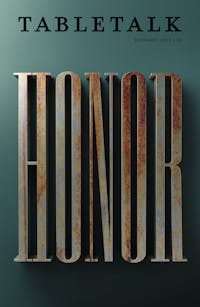
Request your free, three-month trial to Tabletalk magazine. You’ll receive the print issue monthly and gain immediate digital access to decades of archives. This trial is risk-free. No credit card required.
Try Tabletalk NowAlready receive Tabletalk magazine every month?
Verify your email address to gain unlimited access.
We live in an age that increasingly sees honor as a problem to be overcome rather than a virtue to be achieved. Honor is like a piece of furniture we would never want the neighbors to see, an antique that is hidden in the basement. The sociologist Peter Berger once described honor, like chastity, as obsolete in modern secular cultures. “At best,” he said, “honor and chastity are seen as ideological leftovers in the consciousness of obsolete classes, such as military officers or ethnic grandmothers.”
But what would it mean to live in a world without honor? It would be a dark world at war not only with honor but with God.
In a secular age, society proudly claims to be liberated from the shackles of Christian theism and an ethic of divine command. Actually, the secular revolutionaries depend on the persistence of Christian virtues because they have virtually no consistent concept of virtue of their own. What we see looming before us is a secular age without Christian moral virtues. With the tree having been severed from its roots, the branches and leaves now wither and die. One of the cardinal virtues that withers is honor.
The Christian concept of honor emerged as a great correction to the pagan notions of honor that powerfully shaped the ancient world. By God’s gift of common grace in creation, even the ancient pagans yearned for honor, and they often fought and died for it. Augustine rightly observed that the ancient Romans were morally constrained and shaped by their aspiration to honor, both individual and imperial. Augustine’s argument is important, for he reminds us that a culture shaped by the aspiration to honor can be dangerous—but a culture unshaped by such an aspiration is downright deadly.
John Calvin defined honor with theological precision. Rightly understood, he insisted, honor should produce reverence, obedience, and gratitude. A post-Christian culture sets itself against all of these.
Berger warned that society has traded honor for dignity. Christians understand the moral weight of honor and dignity, but Berger was pointing to something of great importance. A secular society sets itself against honor, which requires certain moral virtues, and embraces a notion of individual dignity that requires absolutely no moral virtues. “Dignity, as against honor, always relates to the intrinsic humanity divested of all socially imposed roles or norms,” Berger said. He went on to argue that the modern concept of dignity “pertains to the self as such.”
What does that mean? It means that the modern mandate of dignity against honor undermines any aspiration to virtue. A world without honor is a world of competing claims to dignity. Simultaneously, it is a world without any culturally compelling notion of what it means to be a good person, worthy of honor. It is a world without any culturally compelling notion of what it means to be an honorable society.
The modern prophets of cultural deconstruction, fueled by Marxist critical theory and its many permutations, claim that human liberation can come only by overthrowing the very idea of honor. They point to wars of honor and even to honor codes as evidence of patriarchy, elitism, and moral coercion.
Christians understand all too well how badly honor can be corrupted and misconstrued. We understand that sin threatens to turn every virtue into a vice and that sinful human beings will distort even the virtue of honor. We confess that Christians often fall short of God’s command both to show honor where honor is due and to live honorable lives before the world.
And yet, a world without honor is a world without virtue—a world that has traded light for darkness. A world without honor is a cruel world of crumbling institutions, weakening societies, moral relativism, and a raw lust for power. Look around and see the fracturing of the family, the subversion of marriage, the political intrigues of governments unrestrained by the demand for honor. In a world without honor, the powers that be become deadly powers indeed.
A world without honor would be a world in which a soldier would no longer seek honor on the battlefield, in which a husband and father would no longer seek to deserve honor from his wife and children, in which parents would no longer be bound by honor to remain together in marriage, in which there would be no earthly explanation for why anyone, given the right opportunity, would not lie, cheat, steal, destroy, disparage, defile, commit adultery, or even murder.
In Philippians 4:8, Paul tells Christians to prize “whatever is true, whatever is honorable, whatever is just, whatever is pure, whatever is lovely, whatever is commendable.” In a world without honor, nothing is honorable, nothing is true, nothing is just, nothing is pure, nothing is lovely, nothing is commendable. In such a world, no one aspires to honor, so no virtue survives and no one is safe.
